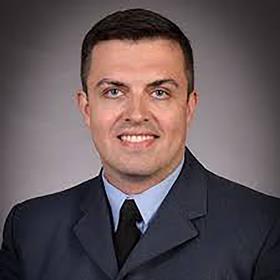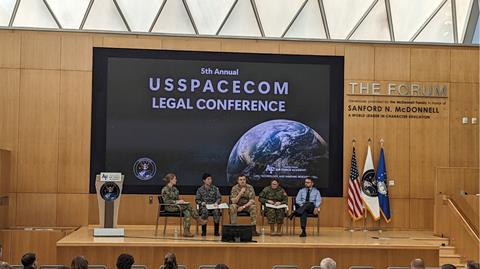Lawyers in outer space sounds like a fine idea, so the joke goes, provided you don’t bring them back. Space is assuredly a harsh domain. Temperatures near our moon’s equator, for example, can reach 121°C in daylight and drop to -133°C come nightfall. Still, despite such hostile conditions, all nations depend on space for prosperity and security.

The UK’s Defence Space Strategy specifies that outer space is a key enabler for His Majesty’s armed forces. This may come as a surprise to some. Yet, in reality, space is an invisible provider of critical terrestrial services generally taken for granted. Satellites afford precision navigation that, inter alia, reduces fossil fuel consumption over long distances. Similarly, space-based services heighten agricultural output, reducing world hunger.
Space has been fundamental to UK military operations for decades. Increasing reliance on space has led the Ministry of Defence to aver that ‘the vast majority of military operations could not be sustained without space capabilities’. Satellite communications provide beyond line-of-sight connectivity critical for military ships and aircraft. The same navigation satellites that help reduce fossil fuels, underpin Google Maps and so on, also deliver the ‘precision’ in many precision-guided munitions (PGMs). These PGMs allow a military target to be neutralised with a very high degree of accuracy. This precision serves both military and humanitarian interests.
The UK is committed to preserving and promoting the safety and security of outer space. It has recently played a leading role in advancing discussions on the responsible use of space at the United Nations. In contrast, on 15 November 2021, Russia tested a direct ascent anti-satellite missile against one of its own redundant spacecraft. This test was widely condemned as both irresponsible and threatening.
Given increased reliance on space, alongside manifest threats to space systems, it should come as no surprise that the Defence Space Strategy confirms outer space is a military operational domain in its own right, alongside air, land, maritime and cyber.
All military operations have a legal dimension. Outer space is no different. This is where Royal Air Force Legal Services (RAFLS) appears front and centre. RAFLS consists of uniformed solicitors and barristers tasked with delivering high-quality, effective and operationally focused legal advice to the RAF and broader defence. I began my career in RAFLS in 2014. I had previously worked as an associate in the corporate tax department of a City law firm but decided I would be far happier as a uniformed legal officer. My decision was rooted in a desire to contribute to protecting and promoting the national interest. For over 100 years, most famously during the Battle of Britain, the RAF has defended our skies and projected UK influence around the world.
I am immensely proud of being a legal officer in the RAF. The challenges and opportunities it has presented me with have unquestionably made me a better lawyer and person.
One such challenge came when, in 2017, I was called upon to advise on military space operations as part of the US Schriever Wargame series. I didn’t join RAFLS with outer space in mind, nor was I intimately familiar with how international law addressed operations in orbit. Nevertheless, as they say, needs must. This initial step launched a burning interest in space that ultimately led to me acting, in a personal capacity, as a ‘core expert’ to The Woomera Manual on the International Law of Military Space Activities and Operations. Published last year, the Woomera Manual is the most comprehensive analysis to date of international law governing military activities in outer space.

My current role within RAFLS sees me act as chief legal advisor at NATO Allied Air Command (AIRCOM). Physically located in Ramstein, Germany, AIRCOM’s mission is to deliver air and space power for the Alliance. Space is essential to NATO’s deterrence and defence posture. Accordingly, in 2024, both the Combined Force Space Component Command and the NATO Space Operations Centre were established at AIRCOM. One of the most rewarding aspects of my current role is advising on myriad issues related to the growth of NATO’s space enterprise. This, in turn, saw me recently speak at the fifth annual US SPACECOM Legal Conference (pictured) held at the US Air Force Academy.
Several other members of RAFLS were able to attend this event. Air vice-marshal Mark Phelps OBE, director of RAFLS, closed the first day of the conference with a keynote address. One of our junior officers, Flight lieutenant Owens, spoke eloquently on ‘space as a team sport’. Flight lieutenant Owens was invited as one of two RAF lawyers currently embedded with UK Space Command. Based at RAF High Wycombe, UK Space Command’s mission is to protect and defend UK and allied interests in, from, and to space. RAFLS has had legal officers at Space Command since its inception in 2021.
A career as a legal officer in the RAF offers a rich range of experiences. My next posting could lead me to the National Cyber Force, Military Aviation Authority, Service Prosecuting Authority or Headquarters Air Command. Most of the options available would likely see a pivot away from space, for now at least, but outer space will remain a keen interest. Space is as inspiring as it is fragile. It needs protecting. It demands defending. It is only fitting, then, that the RAF’s motto – per ardua ad astra – translates to ‘through adversity to the stars’.
Wing commander Kieran Tinkler is a legal officer in the Royal Air Force Legal Services































No comments yet